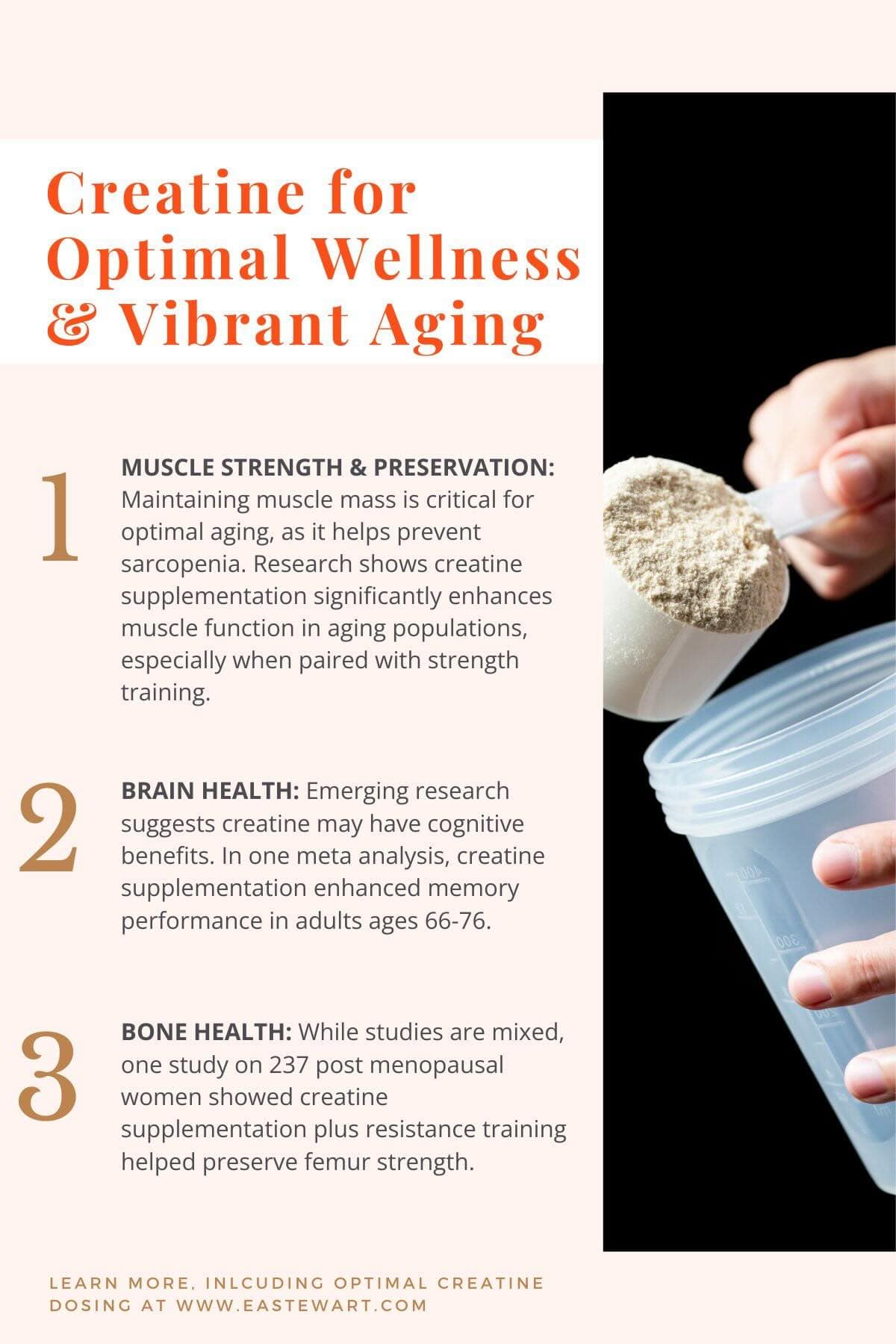Creatine for Healthy Aging: Muscle, Brain, & Bones!
Curious to try creatine? Learn the science-backed benefits of creatine for healthy aging, including muscle strength and brain health. Plus, get dosing recommendations for optimal health and wellness!

While many people associate creatine with athletes and bodybuilders, emerging research highlights its powerful benefits for optimal wellness at all ages, from muscle preservation to brain health and cognitive function. As a registered dietitian, I’m excited to explore how creatine, a safe and beneficial supplement, can support healthy aging and how you can confidently incorporate it into your lifestyle.
What is Creatine?
Creatine is a naturally occurring compound found in small amounts in certain foods and synthesized by the body from the amino acids arginine, glycine, and methionine. While endogenously made creatine provides about half our daily needs, we synthesize the rest, mainly from meat, fish, or supplements. (1)
Creatine is critical in energy production, particularly muscle and brain function, by supporting ATP (adenosine triphosphate) production. While our bodies produce creatine, supplementation can enhance its availability, especially as we age.
Benefits of Creatine for Optimal Wellness and Healthy Aging
Muscle Strength and Preservation, Improved Exercise Performance
When it comes to research on supplements, creatine is a superstar! There has been considerable research on creatine’s impact on muscle strength and power output during resistance exercise across all age groups.
Maintaining muscle mass is especially important for optimal aging, as it helps prevent sarcopenia (muscle loss due to aging), increasing the risk of falls, fractures, and premature mortality. (2)
Research shows that creatine supplementation, particularly when combined with resistance training, helps older adults maintain muscle mass and strength. In addition, creatine enhances exercise performance and recovery, which may promote ongoing regular exercise, one of the best habits for healthy aging.
A 2021 meta-analysis found that creatine supplementation significantly enhances muscle function in aging populations, especially when paired with exercise. (3)
Key Takeaway: Creatine must be combined with resistance training to help muscle strength and preservation for vibrant aging.
Bone Health
To date, research on creatine and bone health is limited and inconclusive. One meta-analysis showed that taking creatine with resistance training didn’t improve bone mineral density (BMD) in older adults. (4)
However, another study on 237 postmenopausal women showed creatine plus resistance training over two years helped preserve femur strength.(5)
Key Takeaway: Maintaining muscle is crucial for bone health, particularly as we age. Supporting muscle mass helps preserve bone mineral density (BMD), decreasing the risk of osteoporosis and fractures. Therefore, preserving muscle mass through regular physical activity and proper nutrition is essential for maintaining bone health and overall mobility for optimal aging.
Creatine: Brain Health & Cognitive Function
While there is much less research on creatine and brain health, emerging research suggests that creatine may have cognitive benefits, especially for people with lower-than-average creatine levels, including vegetarians and older adults.
In a meta-analysis including eight randomized controlled trials (RCTs), creatine supplementation enhanced memory performance in older adults aged 66-76. (6)
Creatine may also benefit cognition by counteracting the adverse effects of sleep deprivation. In a study where participants stayed awake for 21 hours, those who took creatine showed improved thinking abilities and changes in brain energy compounds compared to those who took a placebo. (7)
Key Takeaway: We need more research on creatine and brain health, especially at higher doses, as the amount of creatine reaching the brain is much less than what reaches muscles.
Creatine and Other Potential Health Benefits
- Cardiovascular Health. Eight weeks of creatine supplementation and resistance training reduced homocysteine, a risk factor for cardiovascular disease. (8)
- Type 2 Diabetes. Creatine plus exercise had a positive impact on blood sugar control in people with type 2 diabetes. (9)
- Mental Health. Early clinical trials suggest that creatine may have efficacy as an antidepressant. (10) It may also prove to be useful for Anxiety and Post-Traumatic Stress Disorder. However, studies are limited, and further research is warranted. (11)
- Neurological Disease. There have been some studies on creatine supplementation for Parkinson’s and Huntington’s disease and ALS (amyotrophic lateral sclerosis). To date, creatine supplementation appears limited. Further studies at higher doses are warranted. (12)

How to Boost Your Creatine Level
If you’re an omnivore, you get some creatine from your diet. It’s found mostly in beef, seafood, pork, and lamb. Amounts vary, but one regular serving of these foods provides approximately 0.5-1 gram of creatine per serving. Chicken has creatine, but a little less, at about 0.35 grams per serving.
Because plant foods are very low in creatine, supplementation is especially beneficial for vegetarians and vegans.
Creatine Supplements
What’s The Best Creatine Supplement?
While creatine supplements come in multiple forms, pure creatine monohydrate is the most common and best-researched form. It provides the most significant amount of free, usable creatine and is cost-effective. (13)
While you can purchase creatine monohydrate in pill form, you have to take a significant number of pills. Your best bet is to buy powder and mix it into water or any other liquid. I mix mine in water and find it tasteless. If you’re taking any other powder supplements, such as magnesium, you can take them together with your creatine.
Recommended Dosage
Historically, the standard dosing regimen for creatine supplementation involved a 20-gram-per-day loading phase for 5-7 days. Current dosing guidelines suggest that this pre-loading phase isn’t necessary.
Most studies suggest a daily dose of 3-5 grams for muscle growth and exercise benefits. While larger doses of creatine (10 grams daily) may benefit brain health and cognition, more research is needed.
When To Take Creatine
Take creatine daily for ongoing health benefits. The best time to take creatine is when you remember to take it. While a handful of studies have compared taking creatine pre- or post-resistance training, apart from one study, no differences were observed in body composition or strength changes. (14)
Creatine Safety & Side Effects
Creatine is among the most well-researched supplements, studied in over 500 peer-reviewed publications. While a daily dose of up to 5 grams of creatine is considered safe for long-term use in healthy adults, some questions remain regarding its efficacy and safety. These include possible kidney damage, dehydration, muscle cramping, increased fat mass, and hair loss/baldness.
To answer these questions, an international research team performed an evidence-based scientific evaluation of the literature and concluded: (15)
- Creatine supplementation at recommended doses and in healthy individuals doesn’t result in kidney damage.
- It doesn’t cause dehydration or cramping.
- It doesn’t increase fat mass.
- Most evidence doesn’t support a link between creatine and hair loss/balding.
In addition, while some people experience water retention and weight gain after taking creatine, it’s not common for everyone. When this occurs, it’s likely due to your muscles holding on to more water, especially when starting creatine. Most studies suggest creatine supplementation doesn’t lead to water retention over the long term. (15)
Also, a (favorable) increase in muscle mass may show up as an increase in weight on the scale. It’s important to know that this is an increase in lean body mass, not fat.
On a personal note, I haven’t noted any water retention, weight gain, or other adverse effects from taking 5 grams of creatine daily. If you experience any side effects, stop supplementing with creatine and consult your physician or qualified health provider.
Creatine for Healthy Aging: Key Takeaways
Bottom Line: Creatine is a safe, science-backed supplement that can support healthy aging. Want to learn more or need a creatine supplement recommendation? Leave a comment or get in touch!
Did you enjoy this post?
Please leave your comments or questions and share this post with your friends and family. I truly appreciate your support!






